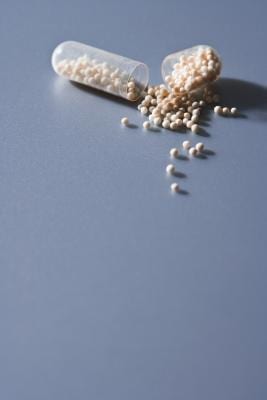The FDA routinely issues press releases announcing the recall of various weight loss supplements. In December 2010, the Authentic Formula Fruta Planta, an herbal weight loss supplement, was pulled from the market because it contained a controlled substance called sibutramine. However, this diet pill recall is one of only many issued by the FDA. You can’t really know what your diet pills contain because the majority of these are classified as dietary supplements — not drugs.
Drugs vs. Supplements
Nonprescription “diet pills” aren’t necessarily weight-loss drugs. In fact, the only weight-loss aid approved by the FDA for over-the-counter sale is reduced-strength orlistat, sold under the trade name Alli. All other weight loss supplements are classified as dietary supplements. Pharmaceutical companies must present research and clinical studies to the FDA before medications are approved for sale and use. However, there’s no pre-market approval process for weight-loss supplements. If you use these products, you have no assurance that they are either safe or effective; you must rely on the claims made by the manufacturer.
Undeclared Ingredients
The FDA relies on makers of weight loss supplements to meet “good manufacturing practices.” These guidelines were put in place so that manufacturers produce dietary supplements in a consistent manner. They also ensure that the dietary supplements contain what the label says they contain and there are no contaminants in the product. However, weight-loss supplement manufacturers sometimes attempt to market a product that contains an undeclared ingredient — and this is when the FDA issues a recall of the tainted product.
Contaminated Products
In December 2008, the FDA issued an alert to consumers warning them of 28 tainted weight-loss supplements that had been recalled. By January 2009, the number of products on the list had jumped from 28 to 69. The weight-loss supplements contained sibutramine, a controlled substance used in prescription anti-obesity drugs; rimonabant, a drug not approved for use in the United States; an anti-seizure medication called phenytoin; an experimental drug called phenolphthalein believed to cause cancer; and the diuretic bumetanide. According to the FDA, some of the medications in the weight loss supplements far exceeded the maximum recommended dose.
Reporting Adverse Events
Another thing to know about weight loss supplements is that even though the FDA does not analyze the contents of these products before they’re put on the market, the agency will intervene and conduct an analysis of the supplement’s contents if there’s a question as to the product’s safety. To make sure dangerous or contaminated products don’t remain available to consumers, the FDA implemented MedWatch, a safety reporting system that provides information about dietary supplement recalls. It also gives you a way to report adverse events you believe to be associated with taking a supplement.
More Protection for Consumers
The Federal Trade Commission is yet another regulatory agency that protects consumers, but in a slightly different way than the FDA. The FTC is responsible for making sure you’re not misled by false marketing statements manufacturers may employ to push a product. In August 2010, a U.S. district court ordered sellers of acai berry supplements to cease sales temporarily due to deceptive advertising and unfair billing practices. The FTC is seeking a permanent ban on acai supplements. Acai berry supplements were listed as one of the “Top 10 Scams and Rip Offs of 2009” by the Better Business Bureau. If you suspect that false statements were used by a marketer to entice you to buy a nonprescription diet pill, file a consumer complaint with the FTC.





